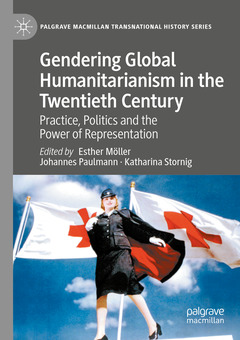Description
Gendering Global Humanitarianism in the Twentieth Century, 1st ed. 2020
Practice, Politics and the Power of Representation
Palgrave Macmillan Transnational History Series
Coordinators: Möller Esther, Paulmann Johannes, Stornig Katharina
Language: English
Publication date: 08-2021
331 p. · 14.8x21 cm · Paperback
Publication date: 08-2020
331 p. · 14.8x21 cm · Hardback
Description
/li>Contents
/li>Biography
/li>Comment
/li>
1. Gendering Twentieth-Century Humanitarianism: An Introduction- Esther Möller, Johannes Paulmann and Katharina Stornig
Part I: Masculinities and Femininities in Humanitarian Practice and Discourse
2. Humanitarian Masculinity: Desire, Character and Heroics, 1876–2018- Bertrand Taithe
3. Protestant Missionaries, Armenian Refugees and Local Relief: Gendered Humanitarianism in Aleppo, 1920–1939- Inger Marie Okkenhaug
4. Maternalism and Feminism in Medical Aid: The American Women’s Hospitals in the United States and in Greece, 1917–1941- Francesca Piana
Part II: Gender and the Politics of Humanitarianism
5. The Orphan Nation: Gendered Humanitarianism for Armenian Survivor Children in Istanbul, 1919–1922- Nazan Maksudyan
6. The Politics of Gender and Community: Non-Governmental Relief in Late Colonial and Early Postcolonial India- Maria Framke
7. Humanitarian Service in the Name of Social Development: The Historic Origins of Women’s Welfare Associations in Saudi Arabia- Nora Derbal
Part III: The Power of Gendered Representations
8. Perilous Beginnings: Infant Mortality, Public Health and the State in Egypt- Beth Baron
10. In/Visible Girls: “Girl Soldiers”, Gender and Humanitarianism in African Conflicts, c. 1955–2005- Stacey Hynd
11. Gender Histories of Humanitarianism: Concepts and Perspectives- Esther Möller, Johannes Paulmann and Katharina Stornig
Discusses the relationship between gender and humanitarian discourses and practices in the twentieth century
Analyses the ways in which constructions, norms and ideologies of gender both shaped and were shaped in global humanitarian contexts
Combines state and non-state humanitarian initiatives and scrutinizes their gendered dimension on local, regional, national and global scales




